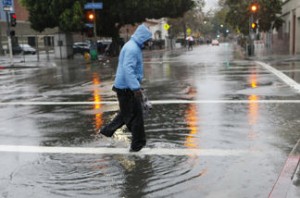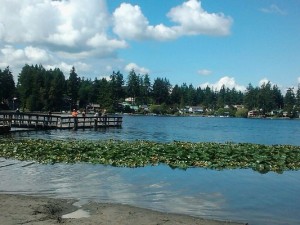Through this unit plan students will:
- explore common issues and debates surrounding water quality
- investigate water quality within their own community
- identify problems and propose solutions to local water quality issues
- share their findings with community members.
Standards Addressed:
- Next Generation Science Standards: HS-LS2-7 –Design, evaluate, and refine a solution for reducing the impacts of human activities on the environment and biodiversity
- Educational Technology Standards: GLE 1.3.1 – Identify and define authentic problems and significant questions for investigation and plan strategies to guide inquiry.

How does water contamination affect local wildlife?
Unit Concepts and Generalizations:
-
Water is a vital resource for all living things. There is a limited supply of water on Earth, and it is susceptible to pollution and overuse.
-
Human activities can negatively impact the environment, whether deliberately or inadvertently. Environmental degradation affects not only natural ecosystems, but the economic and physical health of nearby communities.
-
Community-based solutions to environmental issues are often simpler than nation-wide efforts. However, global networking technologies can be useful tools for spreading awareness throughout a community.
-
Resolving water pollution is often costly. Politics plays a major role in what does and doesn’t get done within a community. Poorer communities tend to be more negatively affected by environmental traumas than wealthier communities.
- Scientific research conducted in other communities can help us to support our claims, but data from research conducted in other communities is not always applicable to our own community. Scientists must acknowledge these short-comings.

Where did all of this garbage come from?
Essential Questions:
-
What happens when communities don’t have access to clean drinking water?
-
What are some water quality issues you notice in your community? (brainstorm)
-
If we can’t rely on larger government entities to solve local environmental issues, what can we do?
-
Why should or shouldn’t community members care about a given issue?
-
How feasible is your solution? Will people use/do it?
-
How do we get people to care?
-
How do we get people to listen to us?
-
How does access to funding and publicity affect our ability to make change within our community?
-
Who and what parts of the community tend to be most negatively impacted by environmental traumas?
-
What will happen to the community if we do nothing?
- How do you know?

How do drainage issues impact water quality?
Culminating Assignment:
- Students will design a solution to one water quality issue they’ve identified within their community. Evaluation will be based on student’s appropriate use of scientific methodology to develop a viable solution.
- Students will create a Glog/poster that informs their community about the water quality issue they’ve identified, it’s relevance to the community, and their proposed solution. Evaluation will be based on student’s clear incorporation of an accurate scientific explanation of the issue, and understandable “everyday” language written with their audience in mind.
- The class will vote on 1-3 posters that they believe can have the greatest impact in the community. Those posters will be displayed around school, in community forums, and/or local business (as appropriate depending on subject matter and access).
This glog will be used to introduce students to the outline and expectations for this culminating assignment. For more information about the use of Glogster, please visit my technology post.
Resources that a teacher could use to further investigate the big idea of this unit:
- National Water Quality Monitoring Council – has up-to-date water quality data for communities across the United States.
- Tapped – documentary about various issues surrounding the bottled water industry and access to clean drinking water.
- West Virginia’s Water Fallout – there are a lot of news articles about the recent water contamination disaster in West Virginia. This Newsweek article explains the whole story (I think).
- Scorecard – Pollution information website that allows you to identify specific polluters within your community, including the names of companies that have contaminated drinking water.
- Surf Your Watershed – EPA site that lets you explore a wide variety of data surrounding your local watershed, including water quality reports, community groups that are supporting watershed improvement, specific issues impacting water quality, and more.


